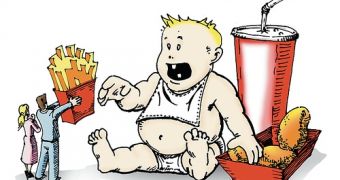The alarming rates of childhood obesity have prompted researchers to try and come up with a feasible solution before it’s too late. Before they do so, though, they have another issue on their hands, as they have come to realize that the problem is even bigger than anticipated since parents can’t even tell when their children are overweight, as the British publication the Daily Mail informs.
According to a recent study, parents misinterpret a weight problem in their kids as “puppy fat” or simply a sign of “one of those stages,” which means that it will most likely go unnoticed until the teen years. As a matter of fact, an overwhelming 70 percent of parents dismiss what are considered “dangerous levels of plumpness” as baby fat that will drop in almost no time, thus putting their children at high risk – the young generation now, plagued as it is by obesity, is believed to become the first to have a shorter lifespan than that of their parents.
Researchers at the Newcastle University, led by Dr. Angela Jones, analyzed the cases of 600 children aged 6-8, weighed and measured them, and then asked their parents to classify their children’s figure using one of the five responses: “very underweight,” “underweight,” “normal,” “overweight” and “very overweight.” As noted above, 70 percent of all parents believed there was nothing wrong with their kids’ weight, despite the fact that they were, actually overweight and obese.
“Childhood overweight and obesity is a global public health concern with significant implications for immediate and long-term health.” Dr. Jones says for the Mail. One explication for why parents are oblivious to the signs in front of them is that they sincerely believe the weight gain is just a stage that the child will soon get over. “Puppy fat comes to mind. I think you’ve got to be very careful – quite often they have a growth spurt and they’re skinny again.” Dr. Jones explains.
Recent figures also indicate that, in the UK alone, one third of all youngsters are too fat for their height, which means that they will be exposed to obesity-related health problems later in life, such as diabetes, cancer and heart disease. This means that education on where a child’s healthy weight should be must start with the parents first, who will thus learn to read the signs. The other kids should be “trained” on how to behave around another child who is a diagnosed obese, while school curricula should also focus on healthy eating and working out, experts say for the same publication.

 14 DAY TRIAL //
14 DAY TRIAL //